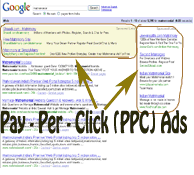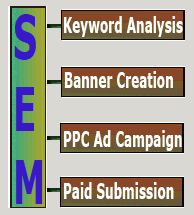About Affiliate Programs: |
|
|
Affiliate programs are web based advertising method in which business rewards publishers or affiliates for each visitor brought by affiliate’s marketing efforts. Affiliate programs are using a website to drive traffic to another web site. Affiliate programs carry a lower profile than some of other online marketing techniques. But, still affiliate programs continue to play a significant role in online retailer marketing strategies.
The basic concept of affiliate programs are revenue sharing. Revenue sharing means paying commission for referred business. Affiliate programs are also called "performance marketing", in reference to how sales employees are typically being compensated. Such employees are typically paid a commission for each sale they close, and sometimes are paid performance incentives for exceeding targeted baselines.
Affiliate programs publisher called as affiliates and could place banner or text links on their site for individual books, or link directly to the advertiser or partner’s home page or product page. When visitors clicked from the affiliate publisher’s website through to advertiser and purchased a product, the affiliates received a commission.
Eighty percent of affiliate programs today use revenue sharing or cost per sale (CPS) as a compensation method, nineteen percent use cost per action (CPA), and the remaining programs use other methods such as cost per click (CPC) or cost per mille (CPM).
Payment Methods :
There are three basic types of affiliate program payment arrangements:
-
1) Pay-per-sale (also called cost-per-sale):
affiliate programs are pays an affiliate when the affiliate sends them a customer who purchases something. Some of affiliate programs Web sites pay the affiliate a percentage of the sale and others pay a fixed amount per sale.
-
2) Pay-per-lead (cost-per-lead):
Companies with these affiliate programs pay their affiliates based on the number of visitors they refer who sign up as leads. This simply means the visitor fills out some requested information at the merchant site, which the merchant site may use as a sales lead or sell to another company as a sales lead.
There are two very popular variations on these basic payment plans of Affiliate programs:
- Two-tier affiliate programs: These affiliate programs have a structure similar to multilevel marketing organizations (also known as "network marketing") such as Amway, which profit through commission sales and sales recruitment. In addition to receiving commissions based on sales, clicks or leads stemming from their own site, affiliates in these programs also receive a commission based on the activity of affiliate sites they refer to the merchant site.
- Residual affiliate Programs: Affiliates in these programs can keep making money off a visitor they send to the site if the visitor continues to purchase goods or services from the merchant site. Many online merchants who receive regular payments from their customers (such as monthly service fees) run this sort of affiliate program.
<<Back














